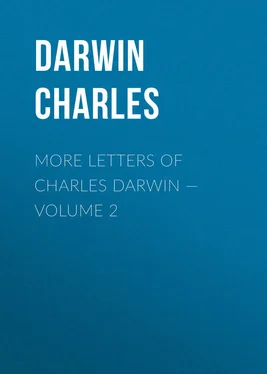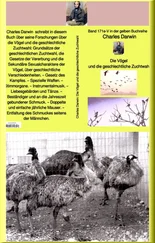Charles Darwin - More Letters of Charles Darwin — Volume 2
Здесь есть возможность читать онлайн «Charles Darwin - More Letters of Charles Darwin — Volume 2» — ознакомительный отрывок электронной книги совершенно бесплатно, а после прочтения отрывка купить полную версию. В некоторых случаях можно слушать аудио, скачать через торрент в формате fb2 и присутствует краткое содержание. Жанр: foreign_antique, foreign_prose, на английском языке. Описание произведения, (предисловие) а так же отзывы посетителей доступны на портале библиотеки ЛибКат.
- Название:More Letters of Charles Darwin — Volume 2
- Автор:
- Жанр:
- Год:неизвестен
- ISBN:нет данных
- Рейтинг книги:5 / 5. Голосов: 1
-
Избранное:Добавить в избранное
- Отзывы:
-
Ваша оценка:
- 100
- 1
- 2
- 3
- 4
- 5
More Letters of Charles Darwin — Volume 2: краткое содержание, описание и аннотация
Предлагаем к чтению аннотацию, описание, краткое содержание или предисловие (зависит от того, что написал сам автор книги «More Letters of Charles Darwin — Volume 2»). Если вы не нашли необходимую информацию о книге — напишите в комментариях, мы постараемся отыскать её.
More Letters of Charles Darwin — Volume 2 — читать онлайн ознакомительный отрывок
Ниже представлен текст книги, разбитый по страницам. Система сохранения места последней прочитанной страницы, позволяет с удобством читать онлайн бесплатно книгу «More Letters of Charles Darwin — Volume 2», без необходимости каждый раз заново искать на чём Вы остановились. Поставьте закладку, и сможете в любой момент перейти на страницу, на которой закончили чтение.
Интервал:
Закладка:
It is a very interesting subject, but I shall not be able to go on with it for the next five or six months, as I am fully employed in correcting dull proof-sheets. When I return to the work I shall find it much better done by you than I could have succeeded in doing.
It is curious how we hit on the same ideas. I have endeavoured to show in my MS. discussion that nearly the same principles account for young birds not being gaily coloured in many cases, but this is too complex a point for a note.
On reading over your letter again, and on further reflection, I do not think (as far as I remember my words) that I expressed myself nearly strongly enough on the value and beauty of your generalisation (429/4. See Letter 203, Volume I.), viz., that all birds in which the female is conspicuously or brightly coloured build in holes or under domes. I thought that this was the explanation in many, perhaps most cases, but do not think I should ever have extended my view to your generalisation. Forgive me troubling you with this P.S.
LETTER 430. TO A.R. WALLACE. Down, May 5th {1867}.
The offer of your valuable notes is most generous, but it would vex me to take so much from you, as it is certain that you could work up the subject very much better than I could. Therefore I earnestly, and without any reservation, hope that you will proceed with your paper, so that I return your notes. You seem already to have well investigated the subject. I confess on receiving your note that I felt rather flat at my recent work being almost thrown away, but I did not intend to show this feeling. As a proof how little advance I had made on the subject, I may mention that though I had been collecting facts on the colouring, and other sexual differences in mammals, your explanation with respect to the females had not occurred to me. I am surprised at my own stupidity, but I have long recognised how much clearer and deeper your insight into matters is than mine. I do not know how far you have attended to the laws of inheritance, so what follows may be obvious to you. I have begun my discussion on sexual selection by showing that new characters often appear in one sex and are transmitted to that sex alone, and that from some unknown cause such characters apparently appear oftener in the male than in the female. Secondly, characters may be developed and be confined to the male, and long afterwards be transferred to the female. Thirdly, characters may arise in either sex and be transmitted to both sexes, either in an equal or unequal degree. In this latter case I have supposed that the survival of the fittest has come into play with female birds and kept the female dull-coloured. With respect to the absence of spurs in the female gallinaceous birds, I presume that they would be in the way during incubation; at least I have got the case of a German breed of fowls in which the hens were spurred, and were found to disturb and break their eggs much. With respect to the females of deer not having horns, I presume it is to save the loss of organised matter. In your note you speak of sexual selection and protection as sufficient to account for the colouring of all animals, but it seems to me doubtful how far this will come into play with some of the lower animals, such as sea anemones, some corals, etc., etc. On the other hand Hackel (430/1. See "Descent of Man" (1901) page 402.) has recently well shown that the transparency and absence of colour in the lower oceanic animals, belonging to the most different classes, may be well accounted for on the principle of protection.
Some time or other I should like much to know where your paper on the nests of birds has appeared, and I shall be extremely anxious to read your paper in the "Westminster Review." (430/2. "Westminster Review," July, 1867.) Your paper on the sexual colouring of birds will, I have no doubt, be very striking. Forgive me, if you can, for a touch of illiberality about your paper.
LETTER 431. TO A.R. WALLACE. March 19th, 1868.
(431/1. "The Variation of Animals and Plants" having been published on January 30th, 1868, Mr. Darwin notes in his diary that on February 4th he "Began on Man and Sexual Selection." He had already (in 1864 and 1867) corresponded with Mr. Wallace on these questions — see for instance the "Life and Letters," III., page 89; but, owing to various interruptions, serious work on the subject did not begin until 1869. The following quotations show the line of work undertaken early in 1868.
Mr. Wallace wrote (March 19th, 1868): "I am glad you have got good materials on sexual selection. It is no doubt a difficult subject. One difficulty to me is, that I do not see how the constant MINUTE variations, which are sufficient for Natural Selection to work with, could be SEXUALLY selected. We seem to require a series of bold and abrupt variations. How can we imagine that an inch in the tail of the peacock, or 1/4-inch in that of the Bird of Paradise, would be noticed and preferred by the female.")
In regard to sexual selection. A girl sees a handsome man, and without observing whether his nose or whiskers are the tenth of an inch longer or shorter than in some other man, admires his appearance and says she will marry him. So, I suppose, with the pea-hen; and the tail has been increased in length merely by, on the whole, presenting a more gorgeous appearance. J. Jenner Weir, however, has given me some facts showing that birds apparently admire details of plumage.
LETTER 432. TO F. MULLER. March 28th {1868}.
I am particularly obliged to you for your observations on the stridulation of the two sexes of Lamellicorns. (432/1. We are unable to find any mention of F. Muller's observations on this point; but the reference is clearly to Darwin's observations on Necrophorus and Pelobius, in which the stridulating rasp was bigger in the males in the first individuals examined, but not so in succeeding specimens. "Descent of Man," Edition II., Volume I., page 382.) I begin to fear that I am completely in error owing to that common cause, viz. mistaking at first individual variability for sexual difference.
I go on working at sexual selection, and, though never idle, I am able to do so little work each day that I make very slow progress. I knew from Azara about the young of the tapir being striped, and about young deer being spotted (432/2. Fritz Muller's views are discussed in the "Descent of Man," Edition II., Volume II., page 305.); I have often reflected on this subject, and know not what to conclude about the loss of the stripes and spots. From the geographical distribution of the striped and unstriped species of Equus there seems to be something very mysterious about the loss of stripes; and I cannot persuade myself that the common ass has lost its stripes owing to being rendered more conspicuous from having stripes and thus exposed to danger.
LETTER 433. TO J. JENNER WEIR.
(433/1. Mr. John Jenner Weir, to whom the following letters are addressed, is frequently quoted in the "Descent of Man" as having supplied Mr. Darwin with information on a variety of subjects.)
Down, February 27th {1868}.
I must thank you for your paper on apterous lepidoptera (433/2. Published by the West Kent Natural History, Microscopical and Photographic Society, Greenwich, 1867. Mr. Weir's paper seems chiefly to have interested Mr. Darwin as affording a good case of gradation in the degree of degradation of the wings in various species.), which has interested me exceedingly, and likewise for the very honourable mention which you make of my name. It is almost a pity that your paper was not published in some Journal in which it would have had a wider distribution. It contained much that was new to me. I think the part about the relation of the wings and spiracles and tracheae might have been made a little clearer. Incidentally, you have done me a good service by reminding me of the rudimentary spurs on the legs of the partridge, for I am now writing on what I have called sexual selection. I believe that I am not mistaken in thinking that you have attended much to birds in confinement, as well as to insects. If you could call to mind any facts bearing on this subject, with birds, insects, or any animals — such as the selection by a female of any particular male — or conversely of a particular female by a male, or on the rivalry between males, or on the allurement of the females by the males, or any such facts, I should be most grateful for the information, if you would have the kindness to communicate it.
Читать дальшеИнтервал:
Закладка:
Похожие книги на «More Letters of Charles Darwin — Volume 2»
Представляем Вашему вниманию похожие книги на «More Letters of Charles Darwin — Volume 2» списком для выбора. Мы отобрали схожую по названию и смыслу литературу в надежде предоставить читателям больше вариантов отыскать новые, интересные, ещё непрочитанные произведения.
Обсуждение, отзывы о книге «More Letters of Charles Darwin — Volume 2» и просто собственные мнения читателей. Оставьте ваши комментарии, напишите, что Вы думаете о произведении, его смысле или главных героях. Укажите что конкретно понравилось, а что нет, и почему Вы так считаете.












